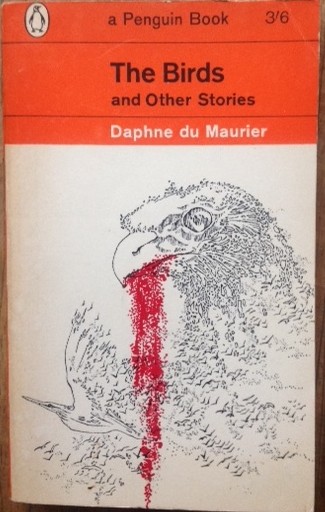Inspiring Older Readers
 posted on 11 Aug 2020
posted on 11 Aug 2020
The Birds by Daphne Du Maurier
The fact that Alfred Hitchcock used Du Maurier’s story as inspiration for his masterful suspense thriller, also called The Birds, has meant that this story has a famous name but, I suspect, has not necessarily led people on to reading it. Hitchcock literally used the story as inspiration rather than as superstructure for his movie plot and the only real content that the film and the short story now have in common is the idea of humanity finding itself under attack by the world’s birds.
Du Maurier sets her tale in Cornwall shortly after the end of the Second World War. In the cold of a deep December, farmer Nat Hocken notices sea birds in the bay of the harbour seem to by acting uncharacteristically and gathering together in large numbers. Although he tries to rouse the interest of other locals in this strange behaviour, his concerns are largely dismissed despite the fact that a flock of small birds invade his children’s bedrooms and he’s forced to kill large numbers.
Alerted by radio reports of unusual bird behaviour right across the country, Nat acts on his instincts and starts to barricade and reinforce his house against possible further avian invasion and lay in some food reserves. Spooked by what he thinks might be further attacks by the birds he goes to meet his daughter, Jill, on the way home from school and turns down the invitation from his neighbour, Trigg, to join him in shooting as many of the birds as he can.
Jill and Nat just make it home safe despite vicious aerial attacks from different birds and they shut themselves in as an all-out attack on their house begins. Fortunately, the house has been made safe against the smaller birds and as the dawn breaks the birds withdraw. Seeking more supplies, Nat heads to Trigg’s farm only to find his neighbours have been slaughtered.
It soon becomes clear that this isn’t just a little local difficulty and that everywhere is under attack from the birds – and when the BBC goes silent too we are left to assume that the worst has happened.
Soon the assault on Nat’s house begins afresh but this time the big birds have been recruited to the task of ripping their way through the hastily constructed house defences. The story ends with Nat lighting his final cigarette and tossing his empty packet into the fire.
The proximity of the story to the Second World War really gives us a clue that this is a story that is tapping into the anxieties that came along with being bombed by German planes for so many years. Sean Fitzpatrick writing on the Daphne Du Maurier website puts it very well:
“The Birds is a clear allegory of the fears associated with the Blitz bombings over London during World War II, and as a meditation on helplessness, so does it bear application to these unstable days. The Birds is a timely piece of literature that poses a fundamental question concerning the makeup of civilization—a story that contemplates the cause and consequence of cultural upheaval and the miraculous balance that is almost universally taken for granted. In short, the incisiveness of The Birds is that of the well-crafted scientific thriller, whose relevance is rooted in presenting the acts of God that could bring the human race to its knees.”
Very little of this finds its way through the Hollywood retelling and that feels like such a shame. I can’t help but feel that in making this into a movie something a whole lot more spooky could have been done with the story than what we ended up with. Du Maurier specialises in the gothic short story and this is a plum and comes in several different editions packaged with a group of other short stories that you'll also enjoy.
Terry Potter
August 2020